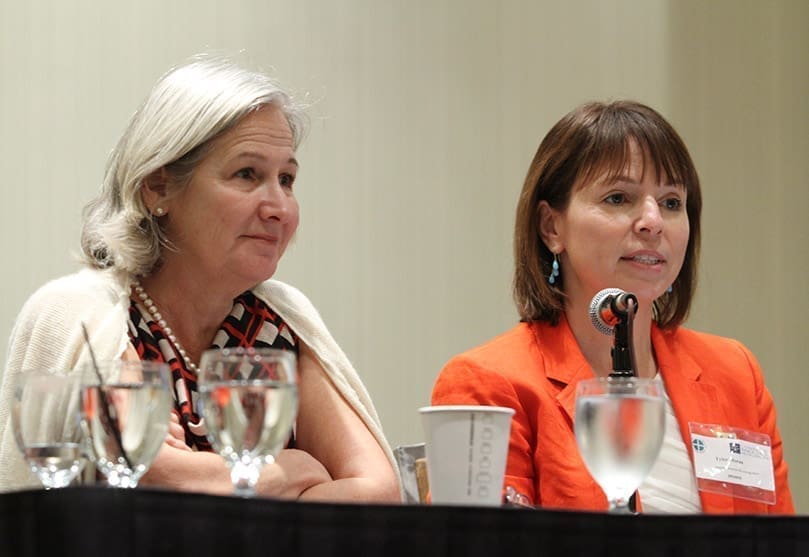 Photo By Michael Alexander
Photo By Michael AlexanderAtlanta
Priority To Deport Criminals Not Reality, Advocates Say
By ANDREW NELSON, Staff Writer | Published December 20, 2012
A wide gulf appeared between Catholic immigration activists and representatives from the federal government during an Atlanta conference Dec. 4 as sisters, priests and other advocates complained how law enforcement measures are sweeping up the wrong people.
Representatives from the U.S. Department of Homeland Security and the White House Domestic Policy Council heard how the authorities are breaking up families and putting people behind bars without a criminal history. The administration has stated its policy is to focus deportation efforts on those who are a threat to the public, either as violent criminals, suspected terrorists or those involved in drug or human trafficking.
“It doesn’t do what it is supposed to do. It is not high-level criminals (being arrested.) It is people,” said Sister Ann Kendrick, a Sister of Notre Dame de Namur. She works at the Hope Community Center in the Diocese of Orlando, Fla.
The panel discussion was part of a three-day immigration conference Dec. 3-5 in Atlanta hosted by the U.S. Conference of Catholic Bishops and the Catholic Legal Immigration Network Inc. It was titled “Migration Policy and Advocacy in 2013 and Beyond: New Challenges and New Opportunities.”

Jaime Huerta, director of the Justice and Peace office for the Archdiocese of Los Angeles, Calif., listens as federal officials respond to immigration issues raised by conference attendees. Photo By Michael Alexander
Activists were concerned that immigrants have been deported at a higher monthly rate with President Barack Obama in office than when President George W. Bush was in the White House.
According to a 2011 study by Syracuse University, during the Bush administration, the annual average total deportations were 219,941 and during the Obama administration, the number increased 12 percent to 246,571.
The same study found government deportation proceedings in immigration courts targeted criminals only 16 percent of the time. Deportations against people who are national security threats and terrorists are extremely rare.
In Georgia, 12,219 people faced deportation proceedings. Nearly eight out of 10 of the individuals entered the country without authorization.
Tyler Moran, the deputy policy director for immigration at the White House Domestic Policy Council, said revising the immigration laws in the country was a top priority after resolving the “fiscal cliff” negotiations.
“He’s very, very committed to this. It is going to be a White House driven process,” she said about the president.
Moran did not offer any details about what the reform would look like. She said the president has already issued a blueprint for reform that should include a pathway to citizenship for undocumented immigrants; sanctioning employers who hire undocumented workers; secure border controls; family reunification and boosting the ability of people with high-tech degrees to stay in the country.

Sister Ann Kendrick, community relations coordinator for the Hope CommUnity Center, Apopka, Fla., raises some immigration issues surrounding questionable arrests and raids to federal officials. Looking on to her right is Juan Pablo Chavez of People Improving Communities Through Organizing (PICO), Tampa, Fla. Photo By Michael Alexander
Faith-based advocates bring a “unique moral voice” to the immigration issue and need to communicate their concerns to national leaders, Moran said.
She said the policy change to allow a two-year deferment of deportation and work permits for some young undocumented immigrants who entered the country as children and have met certain goals in school, or the military, signals the president’s desire to make changes in the situation.
Esther Olavarria, counselor to the secretary of the Department of Homeland Security, said crafting legislation on immigration is a bipartisan effort and it will require seasoned lawmakers and new voices in the political parties to make it happen.
On the issue of the enforcement of immigration laws, Olavarria said the government is reviewing all the enforcement programs, including the Secure Communities program and the 287(g) partnerships with local authorities. She said the goal of the federal government is to be “focused on our highest enforcement priorities,” which are to remove criminally dangerous illegal immigrants.
Kevin Appleby, the director of immigration policy at the
USCCB, told the federal leaders that there was skepticism among the more than 200 people at the conference that the values spoken about by the national leaders trickle down to the grassroots. He said President Obama in the past has pledged to push for immigration reform but without results.
During the last election, President Obama won overwhelmingly the votes from the Latino community.